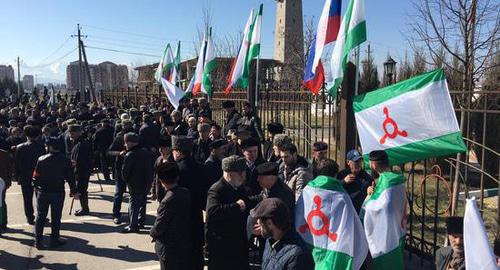
Moscow Pushes for Tighter Control Over North Caucasus Republics
Publication: Eurasia Daily Monitor Volume: 18 Issue: 107
By:

After Ingushetian police officers prevented violent clashes from erupting between protesters and Russian National Guard troops in Magas in March 2019, the authorities disbanded the Ingushetian unit and charged a dozen law enforcement members with failure to comply with an order. An investigation into the case concluded in June 2021. Defenders of the Ingushetian police officers say that they were scapegoated for the failures of higher-up government officials. The police was apparently expected to look on as armed troops from other regions of Russia aggressively dispersed the crowd. Instead, the local officers stood between the protesters and the Russian units to avert bloodshed (Kavkazsky Uzel, June 14).
The demonstrators in Ingushetia were protesting against administrative border changes between their republic and neighboring Chechnya. The two regional governors, Yunus-Bek Yevkurov and Ramzan Kadyrov, respectively, signed the agreement in September 2018, which led to an outcry and street protests in Ingushetia (see EDM, September 27, 2018; see Commentaries, October 23, 2018). In March 2019, after fighting between protesters and the Russian police, the authorities clamped down on the Ingushetian opposition, imprisoning dozens of its leaders (see EDM, January 14, 29, 2020).
Although it is difficult to establish the exact chain of events during the spring 2019 discord in Magas, it seems that the Ingushetian police unit stepped in to actively mediate between the protesters and the external security forces deployed to the republic (Mediazona, March 29, 2019). For the federal authorities, however, the actions of the Ingushetian law enforcement personnel clearly undermined the efficiency and ubiquity of the so-called “power vertical,” which the Kremlin has built and maintained for years. Repercussions for the Ingushetian officers followed swiftly. Apart from disbanding the local police unit, Moscow gradually replaced Ingush police officers with non-Ingush individuals from other regions of Russia. The process infuriated the local officers, and they began complaining to their superiors and the public. Ingushetia’s law enforcement personnel assert that officers brought in from other regions are ill-equipped to do their jobs because they lack micro-level information and cultural awareness (Fortanga, June 7, 2021).
Nevertheless, the Kremlin aims to increase its presence in the North Caucasus still further. In October 2020, a former first deputy director of the Federal Service of the Russian National Guard, Colonel General Sergei Melikov, was appointed as the interim governor of Dagestan (Kremlin.ru, October 5, 2020). While, in April 2021, Vice Admiral Sergei Menyaylo, a former deputy commander of the Black Sea Fleet and governor of the annexed Federal City of Sevastopol, unexpectedly turned up as the acting governor of North Ossetia (Kremlin.ru, April 9, 2021). In the past—even in Soviet times—Moscow had generally avoided appointing people who do not belong to a majority ethnic group as leaders of republics of the North Caucasus. But now, the Kremlin seems so assured of its power that it has crossed this line (Melikov and Menyaylo each has an ethnic-Russian parent). The practice of appointing outsiders as governors is likely to continue in other republics of the North Caucasus, too, unless Melikov and Menyaylo fail.
Moscow’s more hands-on approach in the North Caucasus is not limited to the reshuffle of cadres. Russian Prime Minister Mikhail Mishustin has visited the North Caucasus twice since the start of 2021. The central government now touts a new strategy for the development of the region until 2035. The full extent of the strategy is not yet known, but some of its elements have surfaced. Namely, Moscow plans to increase investment into infrastructure, including the energy sector, and boost spending on education, which is almost exclusively funded by the center (Akcent.site, July 1). Such investment promises come with stringent controls, however. The Russian federal treasury plans to monitor every transaction involving budgetary funds that exceeds three million rubles ($40,000) in the North Caucasus. The new practice will be first implemented in North Ossetia but later extended to other republics of the region. The previous threshold for Moscow’s direct oversight of regional transactions involving government funds was set at 100 million rubles ($1.4 million) (Akcent.site, June 18). The policy change is designed to disrupt regional patronage networks, provide more financing in targeted areas and use them as leverage to increase the overall level of control over North Caucasian societies. The changes will effectively turn regional politicians into bureaucrats with little control over resources and further diminish their agency.
The example of Dagestan—where Moscow installed a complete outsider, Vladimir Vasiliev, as the governor of the republic in 2017 (see EDM, October 13, 2017)—signaled that the heretofore much-feared North Caucasus clans are actually quite feeble and quickly succumb to repression and monetary injections. While Moscow can easily organize repressions in any republic of the North Caucasus (with the exception of Chechnya) under the slogan of “fighting corruption,” state subsidies are an entirely different matter. It is unclear at this point if the Russian elites will resolve to inject extra funds into the North Caucasus to disrupt and replace the local elites. Apart from additional money, the campaign would require an efficient state apparatus and clear objectives. The supplanting of regional elites in Dagestan was successful in the short run; however, the long-term consequences of Russian policies in the republic are unknown. It is also unclear if Moscow’s approach will garner the same amount of success in other republics of the North Caucasus. In any case, the Russian government’s plan to upend the political status quo in the region is underway and likely to start affecting local societies soon.



